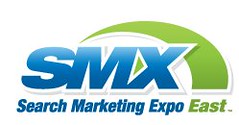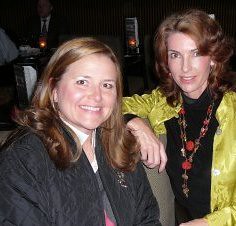 Great conferences don’t happen by accident. That said, the recent SMX East show rates as fabulous. Danny Sullivan, Chris Sherman and the rest of the Third Door folks did an incredible job of putting together a first class show.
Great conferences don’t happen by accident. That said, the recent SMX East show rates as fabulous. Danny Sullivan, Chris Sherman and the rest of the Third Door folks did an incredible job of putting together a first class show.
How they do it is an art form. First, they entice the best keynotes and speakers in the industry to come and openly share their knowledge. (Looking over the list of speakers, I feel privileged and humbled that I’m even allowed to participate.) Then Danny and Chris develop a killer agenda that has broad audience appeal yet is balanced enough to offer something for everyone from the novice marketer to the advanced expert.
Throw in sponsors and exhibitors to help finance the show and provide the attendees cool stuff like wireless connections (thanks Rand), tee shirts, and light-up promotional items that max out the geek meter.
Lastly, you need a hard working dedicated staff to run the lights, music, microphones, registration, and all the other behind-the-scenes things that make the show the A+ event it was. Kudos to Karen, Claire, Michelle, and everyone else involved.
The week leading up to the show was tough. Employee and friend Li Evans unexpectedly lost her father. Another employee had to be rushed to the Emergency Room and spent the week in the hospital undergoing breathing treatments. If that wasn’t enough trauma, during the week, a close family friend succumbed to cancer after a long arduous struggle. While that death wasn’t a total surprise, I found myself emotionally drained. The world felt a little smaller and colder.
Arriving in NYC after such a week meant I really wasn’t in the mood for parties. I was craving quieter smaller exchanges with close friends. One positive thing about conferences is that it brings old friends together. Conference friends have a special place. They may not physically live near us but because we share time and adventures in locales far from our homes where we are without our usual support networks, there is a special bonding and closeness that develops. I have conference friends who are like extended family to me. We take turns looking out for each other and we’ve cried on each other’s shoulders on more than one occasion.
This trip my dear friend Scottie Claiborne popped up to NYC to visit our group of friends and stayed with me. A few years ago Scottie had withdrawn from the conference limelight to focus more on kids and a balanced life. Within a few minutes of seeing Scottie my spirits were brighter. Scottie has that effect on me and most people she comes in contact with. It was great catching up with her.
 One night during the conference a group of friends assembled in the hotel bar to celebrate Debra Mastaler’s birthday. It was comforting to be in the midst of friends and I was genuinely happy to see them. Debra is a popular lady in search and a dear long-time friend. Some of the many friends who stopped by to wish her well were Jill Whalen, Scottie Claiborne, Mike Grehan, Brad Neelan, Mona Eiesseily, Andrew Goodman, Stacy Williams, Li Evans, Kim Krause Berg and her charming husband Eric, Kevin Newcomb, Simon Heseltine, and many others.
One night during the conference a group of friends assembled in the hotel bar to celebrate Debra Mastaler’s birthday. It was comforting to be in the midst of friends and I was genuinely happy to see them. Debra is a popular lady in search and a dear long-time friend. Some of the many friends who stopped by to wish her well were Jill Whalen, Scottie Claiborne, Mike Grehan, Brad Neelan, Mona Eiesseily, Andrew Goodman, Stacy Williams, Li Evans, Kim Krause Berg and her charming husband Eric, Kevin Newcomb, Simon Heseltine, and many others.
I sat in on a number of sessions at the conference and was delighted with the content. It would be hard to choose which was my favorite this conference, so many were excellent. If I was forced to pick just one, I would have to say I enjoyed Gregory Markel’s presentation on video search engine optimization the best. I’ve known Gregory a long time and consider him a friend. I have also learned over the years that embedded in his enthusiastic presentations are really great marketing jewels. You can tell he loves what he does and Gregory is very willing to share his knowledge. If you missed his session at SMX, watch for him at another show. I’ve been in the search business for ten plus years, and I walked out of the session with a few new tricks. Thanks Greg.
That leads me to another topic. The search industry moves too fast to sit on your laurels. You have to actively grow and learn new skills….constantly. If you stand still the industry will pass you by. One of the easiest ways to stay up to date of new changes in the industry is to attend conferences. Books in our industry are outdated before they are printed. Attending conferences gives you more current information and is one of the best professional development practices you can do. Sure, it costs money to attend, but if you get a couple nuggets of new information and network with folks who can help you do your job better, it’s worth every cent.
My next conference, SMX London, is 4-5 November 2008. I’m already looking forward to it. Each conference has its own flavor and the London show is a great place to learn about all things search, but especially learn about international marketing techniques.
I’ll be speaking on two panels in London. Dear friend Tor Crockatt (who is not only drop dead beautiful, but is a first class marketer) and I will be paired up in a Keyword Research Bootcamp. I’ve spoken on panels with Tor many times and it’s always thrilling to share the podium with someone as knowledgeable and fun as Tor. There is good chemistry between us. Keeping us in line (or trying to) will be moderator and conference co-chair Chris Sherman. Good luck Chris, we outnumber you.
My other speaking session at SMX London is the Paid Search Checkup panel. Paid Search wizard Mel Carson and I will interactively review paid search campaigns and provide constructive advice to improve them. Live clinics are my favorite type sessions because you never know what will be thrown at you. They are also where you, as an advertiser, can get free advice from experienced marketers. If you are already an expert marketer, it’s nice to get a second opinion if you’re looking for new ideas on marketing. The cross fertilization of tips and experience in the clinic makes for a rich exchange where everyone benefits.
Well, I’ve managed to ramble on a number of topics and even cross the globe in a very short time. You have things to do, so I’ll close by saying I hope to see you at a conference soon. And please, do come up and say hello if you attend. I’m very approachable, human, and always open to make a new search friend.
Christine
 KeyRelevance President Christine Churchill is teaming with Shelly Ellis to provide a presentation on keyword research. The event will be held at the Renaissance Hotel in Richardson, Texas at 6:30 PM on 19 February.
KeyRelevance President Christine Churchill is teaming with Shelly Ellis to provide a presentation on keyword research. The event will be held at the Renaissance Hotel in Richardson, Texas at 6:30 PM on 19 February. 
 Great conferences don’t happen by accident. That said, the recent
Great conferences don’t happen by accident. That said, the recent  One night during the conference a group of friends assembled in the hotel bar to celebrate
One night during the conference a group of friends assembled in the hotel bar to celebrate 